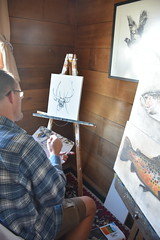Wednesday, December 7, 2005
Australian researchers say they have scientifically proven that stress causes sickness. The Garvan Institute in Sydney has discovered that a hormone, known as neuropeptide Y (NPY) is released into the body during times of stress. Their findings show the hormone can stop the immune system from functioning properly.
“Neuropeptide Y is one of those hormones that gets unregulated or released from neurones when stressful situations occur…it’s known for example that it regulates blood pressure and heart rates so your heart rate goes up but it hasn’t been known that it actually can affect immune cells as well,” said Professor Herbert Herzog, one of the researchers.
Herzog feels it is good to finally have proof of something people have suspected for so long.
“Now we have proven without doubt that there is a direct link and that stress can weaken the immune system and that makes you more vulnerable when you for example have a cold or flu and even in the more serious situations such as cancer can be enhanced in these situations,” said Herzog.
The Garvan Institute study centres on two key events that enable the human body to recognise foreign substances and control invaders. When our body encounters a pathogen (bacteria and viruses), the immune cells retain and interrogate suspects. Their activation is made possible by NPY. These cells then return to the lymph nodes, which are found all over the body, with information about the foreign invaders. The lymph nodes are where decisions about defence are made.
“Most of us expect to come down with a cold or other illness when we are under pressure, but until now we have mostly had circumstantial evidence for a link between the brain and the immune system,” said lead Garvan researcher, associate Professor Fabienne Mackay. “During periods of stress, nerves release a lot of NPY and it gets into the bloodstream, where it directly impacts on the cells in the immune system that look out for and destroy pathogens (bacteria and viruses) in the body.”
In the case of bacteria and viruses, TH1 cells are part of the attack team that is sent out on the ‘search and destroy’ mission. But when their job is done they need to be turned ‘off’ and the immune system reset. The same hormone, NPY, that activates the sentry cells now prompts the TH1 cells to slow down and die.
“Under normal conditions, circulating immune cells produce small amounts of NPY, which enables the immune cells on sentry duty and the TH1 immune cells to operate – it’s a yin and yang kind of situation. But too much NPY means that the TH1 attack is prevented despite the foreign invaders being identified – and this is what happens during stress,” added McKay.
The impact of stress on the body has been observed in athletes. Ph. D researcher at the University of Queensland, Luke Spence, together with the Australian Institute of Sport, studied elite and recreational athletes over five months.
They found elite athletes were more susceptible to respiratory diseases under stress.
“A lot of elite athletes put themselves through vast amounts of physical stress in their training, but also their emotional, psychological stress of feeling the pressure of Australia on their shoulders, wanting to compete and wanting to do their best,” said Spence.
It’s not just athletes who are prone to stress. Pressures at work and at home may cause emotional and mental stress that can be equally damaging. Almost a third of all work absenteeism in Australia is due to illness, costing employers over $10 billion a year.
“I think it has a huge impact for the work force and also for employers – if their employees are constantly stressed, constantly under pressure, they are more likely to get sick,” Spence said.
Further research could lead to the development of new drugs which may inhibit the action of the neuropeptide Y hormone.
Herzog warns people to minimise stress before it becomes a problem.
“Relaxation methods like yoga will help you to prevent that but there will still be people out there that are not responding to that and treatment by interfering with the system will be important,” he said. “There’s obviously some time until such a treatment will be available but this is something we will definitely work towards.”
The Garvan research will be published in the Journal of Experimental Medicine, Volume 202, No. 11.

